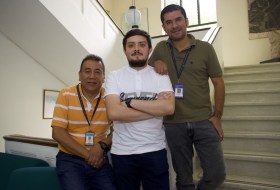News
Green chemistry project developed by the Department of Chemistry with support from the Unicauca Vice-Rector for Research concludes
Research - Tuesday, March 7, 2023
Green chemistry project developed by the Department of Chemistry with support from the Unicauca Vice-Rector for Research concludes
The Chemical Research Group of Natural Products (QPN) attached to the Department of Chemistry of the Faculty of Natural, Exact and Education Sciences, completed with great satisfaction the project "Synthesis assisted under microwave irradiation: a green methodology for obtaining 2,2':6',2”-4'-substituted terpyridines (2-Tpy's)”, in the field of organic chemistry, which was carried out thanks to the support of the Vice-Rector for Research of the University of Cauca, through of their internal calls
This project contributes new knowledge and literature to the Green Chemistry approach, a concept that has been gaining more and more strength in search of best practices that reduce the generation of waste and pollution, optimizing the use of energy, process times and use of resources. Alternatives, for the synthesis of compounds with different types of applicability, reduce the environmental impact of such an important science for the development of our region, such as chemistry.
Professor Danny Alejandro Arteaga Fuertes, a researcher of this process, indicated that “this research proposes the construction of molecular architectures based on conjugated heterocyclic systems with heteroatoms, mainly nitrogen, which are called terpyridines. We want to take advantage of the convergent distribution that the nitrogen atoms have on the aromatic rings […] to be able to later evaluate their chelating capacity, thinking about the applicability that they may have in the future”. Although this type of synthesis has been extensively studied, among them by Professor Arteaga, in his doctoral thesis, what is sought with the project is to provide new methodologies applying the principles of green chemistry, an approach that has been strongly developed in the Department of Chemistry, applying synthesis and extraction processes through heating systems assisted by microwave radiation to optimize these processes.
Luis Alberto Lenis Velázquez, research professor in the Department of Chemistry and leader of the Natural Products Chemistry research group, also took part in this project, points out that "the interesting thing about this experience is that progress has been made in a methodology that reduces process times and increasing reaction yields. We apply the Methodology defined by Kröhnke, used internationally for the synthesis of this type of compound, we have managed to go from using 20 hours in the process to doing it in just two hours and 15 minutes”. This means that a notable improvement has been achieved from the environmental point of view, since by reducing the time for this synthesis, the amount of energy and water used in the cooling system that the reaction needs is also reduced.
Daniel Alexander Fajardo Perafán is a 10th semester student of the Chemistry Program at our university, he is part of the same research group and was linked to the project, carrying out his research as a degree project. His role in this team of researchers consisted of synthesizing the derivatives under organic reactions, defined within the framework of an experimental design, first through conventional processes and later using microwave irradiation. From his experience, Daniel reflects that, normally, chemistry is considered a science that emits a lot of polluting residues due to its processes, therefore, the green chemistry approach is essential for the reduction of compounds that can be toxic to ecosystems, and consequently, for the human being. In this sense, this project sought to implement resources with less environmental impact, such as microwave radiation, which allows more effective and faster heating procedures, since in the past, organic chemistry used large amounts of energy. “In this project we have managed to use low amounts of energy and still obtain good reaction yields. So this experience is very important to strengthen green chemistry, because as students we can also make a contribution to avoid further contamination of the environment”.


